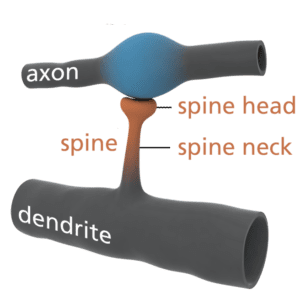

Early alterations in the nervous system caused by prions include changes in the synapse such as retraction of dendritic spines, the projections where synaptic contacts occur (illustrated; image credit). Understanding these pathologies has been difficult due to a lack of an appropriate neuronal culture system.
To determine if prions are toxic for neurons, primary neuronal cultures were prepared from mice and grown on layers of astrocytes. Addition of an infected brain homogenate from mice that had been inoculated with the scrapie prion, PrPsc, led within 24 hours to retraction of dendritic spines and a reduction in their number and area. Similar effects on dendritic spines were also observed when purified PrPsc was used.
No effects of brain homogenates were observed using neurons prepared from mice lacking the prion gene prnp. This observation might have been predicted because prion diseases do not occur in mice lacking the prnp gene. However only an N-terminal domain of PrPc (amino acids 23-31) is required for the loss of dendritic spines. It seems likely that this part of PrPc on neurons binds the pathogenic PrPsc form, leading to neuronal loss.
Normal prions (PrPc) are completely digested with the enzyme proteinase K, while the pathogenic prion PrPsc is relatively resistant. Proteinase K treated PrPsc retained the ability to cause retraction of dendritic spines, showing that amino acids 23-90 of the protein are not needed for synaptotoxicity.
Dendritic spines are responsible for excitatory postsynaptic transmission and have roles in learning and memory. Their retraction by pathogenic prions are likely early changes leading to the pathogenic consequences of TSEs. How prions cause spine retractions can now be determined using cultured neurons. It will also be possible to determine if similar mechanisms are involved in dendritic spine loss associated with other neurodegenerative diseases, such as Alzheimer’s, Huntington’s, and Parkinson’s diseases.

Pingback: mycology | [Veterinary and Medical Sciences
Pingback: How prions make you sick – Virology